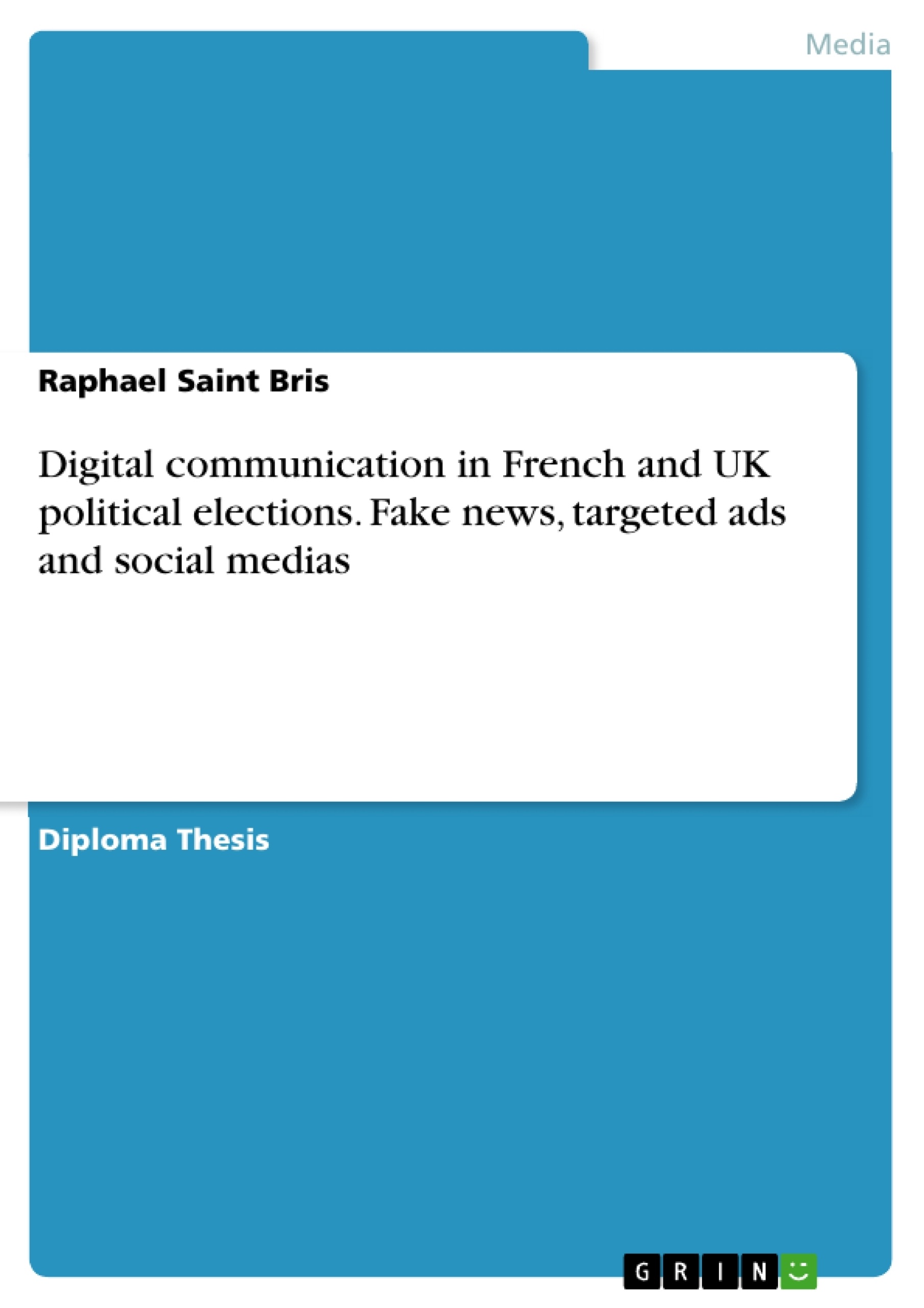This little dissertation aimed to compare French conservative and British sensationalistic communication practices during political campaigning through an analysis of the political communication history in both countries, a reminder of fundamental political communication notions and a focus on the modern use of digital communication over last presidential elections. Then, the objective was to understand the influence of fake news, targeted ads and social medias on the communication methods used by the politicians through a comparison of different studies conducted on this topic and an analysis of a focus group debate between five millennials of both French and British nationalities.
Inhaltsverzeichnis (Table of Contents)
- I. Introduction
- II. Literature Review
- A. Fundamental notions of political communication.
- 1. The influence of political communication
- 2. Democracy and strategic communication..
- 3. What is digital political communication all about?
- B. French digital communication among electoral campaigns
- 1. The political conservative communication French touch
- 2. The use of social medias along 2012 and 2017 presidential elections..
- 3. Targeted advertising and fake news impact on French elections....
- C. British digital communication among electoral campaigns
- 1. British tabloids, spin doctors and sensationalistic communication..
- 2. Social medias utilisation during Brexit, 2015 and 2017 general elections
- 3. The role of targeted advertising and fake news on British campaigning.
- D. Conclusion & hypothesis
- A. Fundamental notions of political communication.
- III. Field Research
- A. Methodology
- B. Objectives.
- C. Results
- IV. Strategic Recommendations.
- V. Appendices.
- Focus Group
- VI. Bibliography
Zielsetzung und Themenschwerpunkte (Objectives and Key Themes)
This dissertation examines the impact of digital communication on political elections in France and the UK. It aims to investigate the influence of fake news, targeted advertising, and social media platforms on political campaigns and voting behavior. The dissertation explores the historical context of political communication, analyzes the role of new communication technologies in elections, and investigates the impact of online scandals and rumors on voter perception.- The evolution of political communication in the digital era
- The use of social media platforms in political campaigns
- The impact of fake news and targeted advertising on elections
- The role of online scandals and rumors in shaping public opinion
- The implications of digital communication for democratic processes
Zusammenfassung der Kapitel (Chapter Summaries)
- I. Introduction: This chapter introduces the topic of digital communication in political elections, highlighting the significant changes brought about by the rise of new communication technologies and the democratisation of access to information. It discusses the impact of digital communication on political campaigns and the emergence of new forms of political communication, such as the use of social media platforms and the spread of fake news.
- II. Literature Review: This chapter explores existing research on political communication, focusing on the influence of new technologies and the role of social media platforms in shaping public opinion. It analyzes the impact of digital communication on elections in France and the UK, including the use of targeted advertising and the spread of fake news.
- III. Field Research: This chapter outlines the methodology used to conduct the research, detailing the objectives and methods employed to collect and analyze data. It presents the results of the research, providing insights into the role of digital communication in political elections.
- IV. Strategic Recommendations: This chapter presents recommendations for politicians and political campaigns on how to effectively utilize digital communication strategies in the context of modern elections. It emphasizes the importance of transparency, accountability, and ethical practices in online communication.
Schlüsselwörter (Keywords)
This dissertation explores the key themes of political communication, digital communication, social media, fake news, targeted advertising, electoral campaigns, political scandals, and public opinion. It examines the impact of these factors on elections in France and the UK, with a particular focus on the use of digital communication strategies by politicians and political parties.Frequently Asked Questions
How did digital communication impact the French 2017 elections?
The 2017 elections saw a significant rise in social media use, targeted advertising, and the influence of fake news on voter perception.
What are "spin doctors" in British politics?
Spin doctors are communication experts who use sensationalistic practices and media manipulation to shape a politician's public image, particularly in the UK tabloid culture.
How do targeted ads influence voters?
Targeted ads use data to deliver specific political messages to niche audiences, potentially creating "echo chambers" and influencing voting behavior without public scrutiny.
What role did fake news play in the Brexit campaign?
Fake news and online rumors were used to sway public opinion during the Brexit referendum, highlighting the challenges digital communication poses to democratic processes.
What do millennials think about digital political communication?
Research through focus groups shows that millennials are highly aware of digital strategies but are also vulnerable to the psychological impacts of online scandals and targeted messaging.
- Quote paper
- Raphael Saint Bris (Author), 2017, Digital communication in French and UK political elections. Fake news, targeted ads and social medias, Munich, GRIN Verlag, https://www.grin.com/document/387212



